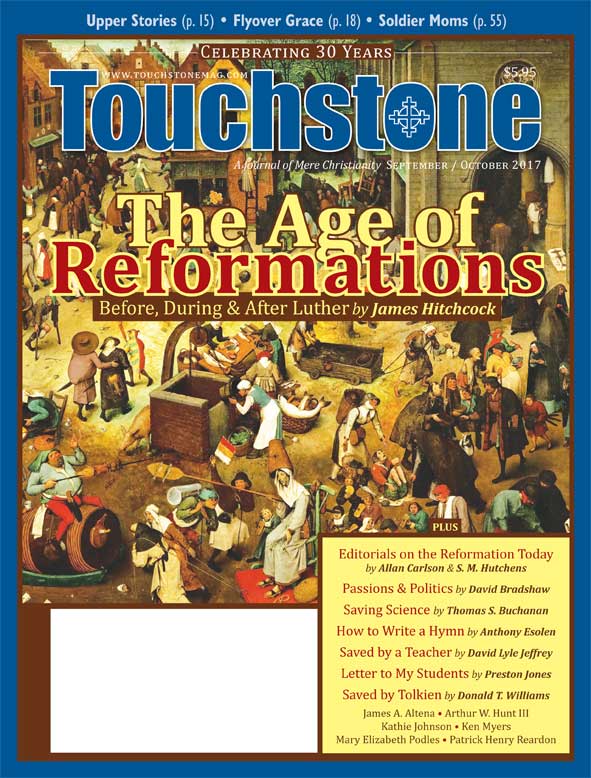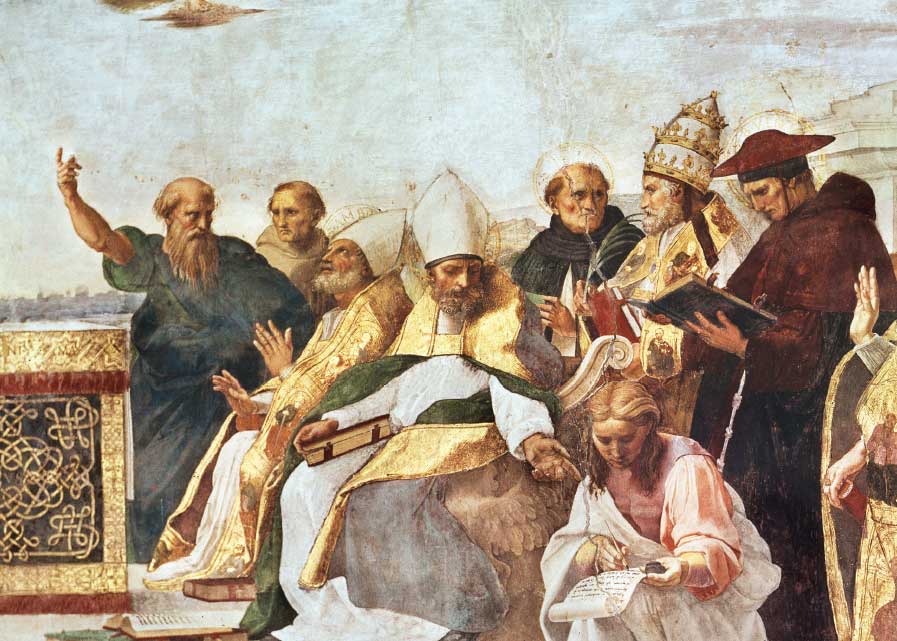Feature
One Good Teacher
Why I'll Never Forget Pop Shaver As Long As I Live by David Lyle Jeffrey
Almost everyone can remember a teacher who wasn't insufferable. Maybe, if you were lucky, you even had one who made a difference. A few of us are thankful for a teacher who turned our lives around. In my case it was Bernard Shaver—"Pop" Shaver as he was universally known outside of class—a grade-eight teacher whose specialty at Glashan Public School was unruly boys, lads with a penchant for too frequently exhibiting a surfeit of testosterone. All 36 of us in his 1952–1953 class came trailing a litter of misdemeanor citations; neither our previous schools nor our parents had proven sufficient for our correction. We were segregated from the girls our age (mostly 12 and 13) for good reasons. I don't remember the name of their teacher, or the name of the one who taught the "normal" boys, either. But I'll never forget Pop Shaver as long as I live.
He was already in his sixties, of middle height but with large, strong, bony hands. His face was creased, his nose also large, and there was a sparkle in his eyes and sometimes fire. Yet he had a wonderful beaming smile that could as suddenly light up the classroom as his frown could shut it down; he had a gravelly voice that made him seem forever hoarse, as if he had once had a cold he never quite got over, but it was a voice you wanted to listen to—carefully. One of the students, a chap named Rich Little, could mimic Pop well enough that he would scare and scatter us when we were rolling dice for money in the school basement—so good was he, in fact, that one time it really was Pop calling down the stairs, and I can attest that, believing it was just Rich, we did not scatter fast enough. That was not such a good day.
Pop taught us mathematics and English. We had classes in woodworking and metalwork to which we went twice weekly, and a class in music appreciation on Fridays. I remember the two shop teachers, Mr. Fraser and Mr. Castleman, but not the name of the music teacher, who was a bit of a twit and who, because I disliked opera, made me do my term paper on Puccini's Madame Butterfly. Social studies, with the eminently distractible Mrs. MacDonald, we had gotten out of the way back in grade seven, so the only other non-Shaver class besides Phys Ed was French, for which an intern-instructor from the Normal School came to us, also twice a week.
What this meant in sum is that from 8 to 11 a.m., before our one-hour "other" classes, five days a week, Pop Shaver taught us math. He worked us hard, and we got good at it, much better than we knew until Pop came to class with first one, then two, then three of our tests, which a friend of his had administered at Lisgar Collegiate to the graduation class, five years our senior. (We had, by Christmas, significantly better scores.) The entirety of every afternoon was reserved for English.
A Man for Text & Context
It would not be too much to say, in my case, that these afternoons utterly transformed my life. I had been reading adult books avidly on my own for three or four years—Dickens, Scott, Eliot, de Maupassant, Hugo, and others. But I had never before had the experience of thoughtful, penetrating conversation about such books, or of questions that made you delve far more deeply into their thought. Pop was not just a sharp mathematician, but also a man of the text; as I can better see now, he was an acute reader with a prodigious memory, a supple imagination, and critical acumen. But he was also a man for contexts; he would tell us fascinating things about an author's life and times, historical events that swept over the author's horizon and still cast shadows on our own. He had a fine ear for irony, such as most twelve-year-old boys do not, and he would draw it out for us, often just by reading aloud brilliantly until he saw our lights come on. Then he would laugh, and exclaim, "Isn't it marvelous, lads?" We came to agree, then to anticipate.
Not in the least afraid of morality, he would arrange texts so that in their succession in his syllabus (which we never got except as he announced it weekly) the connections would gradually dawn on us, setting him up for a deeper but pithy lesson. Thus, in the autumn we read (and learned to act out the parts of) Shakespeare's Merchant of Venice. The cruelty of Shylock in that play is overmatched by Portia's mercy, you may remember, but not many came to sympathize with Shylock.
When in February we came to Ivanhoe, however, something different happened. The wounded Ivanhoe's life is saved by Isaac the Jew and his beautiful daughter Rebecca, who nurses him back to health. When, at the -denouement, Ivanhoe is wedded to Rowena, as destiny demands, and Isaac and Rebecca sail to Granada to rejoin the Sephardic community, some of us were a bit disappointed. "How many of you were hoping he would marry Rebecca?" Some of us raised our hands. "Me too," he said with a smile and a wink. We weren't just plodding through texts.
We didn't immediately realize, of course, just how unusual our experience was. All we knew is that for the first time in our lives we weren't bored to death by school, and that when Pop was teaching he had our full attention. One day two young men appeared at the classroom door. Just as Pop went to greet them a message came from the principal's office that he was wanted on the phone, so he asked the young men to wait in the class till he returned. "Boys," he said to us, "these fellows are former students from this class who are now studying for their degrees at Cambridge, in England." He introduced them by name, and left.
One of the boys came in and sat at his desk (Pop almost never sat there—he always taught standing or moving about), the other leaned with his rear on the top of the desk, facing us, and said, "I hope you little thugs know what you've got here; maybe the best teacher in the world." The other said, "Without this man we'd be working in a lumberyard or maybe in jail. He changed us. We just came back to thank him." For five minutes they let us ask questions about university life and about Cambridge. I don't think the idea of university had crossed many of our minds before—certainly not mine. Then Pop suddenly came back, cheerily asked the two some questions of his own, and with a pat on their shoulders saw them out the door. "Alright, boys, now for us it's back to work."
David Lyle Jeffrey is Distinguished Professor Emeritus of Literature and the Humanities at Baylor University and Resident Distinguished Professor of Baylor Institute for Studies in Religion.
subscription options
Order
Print/Online Subscription

Get six issues (one year) of Touchstone PLUS full online access including pdf downloads for only $39.95. That's only $3.34 per month!
Order
Online Only
Subscription

Get a one-year full-access subscription to the Touchstone online archives for only $19.95. That's only $1.66 per month!
bulk subscriptions
Order Touchstone subscriptions in bulk and save $10 per sub! Each subscription includes 6 issues of Touchstone plus full online access to touchstonemag.com—including archives, videos, and pdf downloads of recent issues for only $29.95 each! Great for churches or study groups.
Transactions will be processed on a secure server.
more on memoir from the online archives
more from the online archives
calling all readers
Please Donate
"There are magazines worth reading but few worth saving . . . Touchstone is just such a magazine."
—Alice von Hildebrand
"Here we do not concede one square millimeter of territory to falsehood, folly, contemporary sentimentality, or fashion. We speak the truth, and let God be our judge. . . . Touchstone is the one committedly Christian conservative journal."
—Anthony Esolen, Touchstone senior editor










